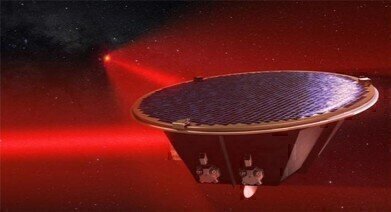-
 Artist's impression of a Laser Interferometer Space Antenna (LISA) mission concept spacecraft. (Credit: AEI/Milde Marketing/Exozet)
Artist's impression of a Laser Interferometer Space Antenna (LISA) mission concept spacecraft. (Credit: AEI/Milde Marketing/Exozet)
News
Key Role for Scottish Scientists in Gravitational Wave Studies
Jun 22 2018
Supported by £1.7 million initial funding from the UK Space Agency, scientists in Scotland will work on the world's first ever Gravitational Wave Space Observatory, which will study ripples in space and time.
The UK, through the work of the University of Glasgow’s Institute for Gravitational Research and the Science and Technology Facilities Council’s UK Astronomy Technology Centre (UK ATC) in Edinburgh, will develop the optical benches for the European Space Agency’s LISA mission (Laser Interferometer Space Antenna). These optical benches are at the core of the laser interferometry measurement system, the key technology needed to detect gravitational waves.
The space observatory, planned for launch in the 2030s, will allow scientists to study these mysterious waves, improving our knowledge of the beginning, evolution and structure of the Universe. It will build on the success the LISA Pathfinder mission, which in 2016 demonstrated the technology needed for LISA and also work of scientists currently contributing to the ongoing LIGO project that made the first detection of gravitational waves in 2015.
Chris Lee, Head of Space Science at the UK Space Agency, said:
“The University of Glasgow has a worldwide reputation for gravitational waves research, with the pioneering work of Professor Ron Drever in the 1960s leading to the Nobel Prize-winning detection of the waves in 2015. This new funding ensures this legacy continues with the LISA mission, alongside crucial technology innovation from the UK ATC in Edinburgh.”
Dr Ewan Fitzsimons, part of the team at Glasgow which developed the LISA Pathfinder optical bench and is now leading the LISA team at STFC’s UK ATC, said:
“It’s a very interesting time right now – the amazing science that LIGO has enabled is showing us the potential of gravitational wave astronomy to revolutionise our understanding of the Universe. In addition, the success of the LISA Pathfinder mission and now the commencement of work on LISA with UK participation has been excellent news.
Dr Harry Ward, who leads the University of Glasgow’s LISA team, added: “After working very hard for over 15 years to bring LISA Pathfinder to such a successful conclusion, we are very happy indeed to be so strongly supported to take the crucial next step towards LISA. This commitment from the UK Space Agency will ensure that UK technology will lie at the heart of the most revolutionary astronomy mission of the next 20 years.”
Digital Edition
Lab Asia Dec 2025
December 2025
Chromatography Articles- Cutting-edge sample preparation tools help laboratories to stay ahead of the curveMass Spectrometry & Spectroscopy Articles- Unlocking the complexity of metabolomics: Pushi...
View all digital editions
Events
Jan 21 2026 Tokyo, Japan
Jan 28 2026 Tokyo, Japan
Jan 29 2026 New Delhi, India
Feb 07 2026 Boston, MA, USA
Asia Pharma Expo/Asia Lab Expo
Feb 12 2026 Dhaka, Bangladesh


















